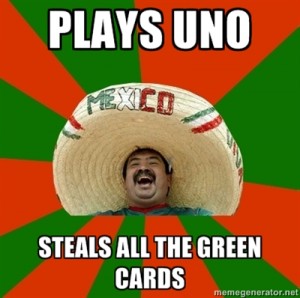When I signed up for this class I had no idea what to expect. I decided to enroll because I wanted to take an English class that was not literature-based. Although I did think that the class would require us to interact more with technology, I enjoyed learning about new media and the impacts of technology from an academic standpoint.
In the beginning of the semester we discussed our broad opinions about new media. I remember referring to new media, specifically the internet, as a faceless equal playing field where race and gender do not matter. Throughout the course of the semester, I realized that I was misguided in my original interpretation of new media.
Contrary to my initial view, we learned that often new media perpetuates racism and the objectification and degradation of women. In class we discussed racist memes which, due to the ease with which they can be copied, rapidly spread and thus widely and quickly promote their racist message.
We also discussed how video games degrade women through hypersexualization while also over-representing white men by almost exclusively portraying white males as heroes. While in these two instances new media popularizes negative stereotypes and creates new negative stereotypes about women and about different races, new media also offers a place for misrepresented and underrepresented groups to express themselves. We learned about how web series offer a place for these misrepresented and underrepresented groups to create shows that focus on the specific problems that their groups face unrestrained by the tenants of traditional network television.
In addition to learning about race and gender in new media, we also discussed how Google and Youtube dictate our searches and thus dictate both our knowledge and who grows popular on the internet. I used to view YouTube and Google as places where anyone could have their blog discovered or could post a video and grow famous. Now I realize that YouTube and Google are, at their core, businesses, and, that advertisers rather than users exist as YouTube’s and Google’s customers. Because advertisers are Google’s and YouTube’s customers – YouTube promotes videos and Google promotes websites based on which websites or videos receive the most views, or based on who pays for promotion. While I appreciate the existence of Google and Youtube as free services, I recognize that the validity of information or the quality of content is not Youtube’s or Google’s first concern when yielding search results.
Overall, this course taught me to recognize the importance of digital literacy and to develop my own digital literacy. While the internet does offer a place for anyone to have a voice, the business-minded nature of websites that control our searches, namely Google and YouTube, makes some content difficult to discover. In addition, I learned that it is important to recognize that while the internet gives misrepresented and underrepresented groups a place to express themselves, it also promotes racism and degradation and objectification of women by idolizing white men and by perpetuating negative race and gender stereotypes.
* * *
[youtube]https://www.youtube.com/watch?v=W2UZZV3xU6Q[/youtube]

